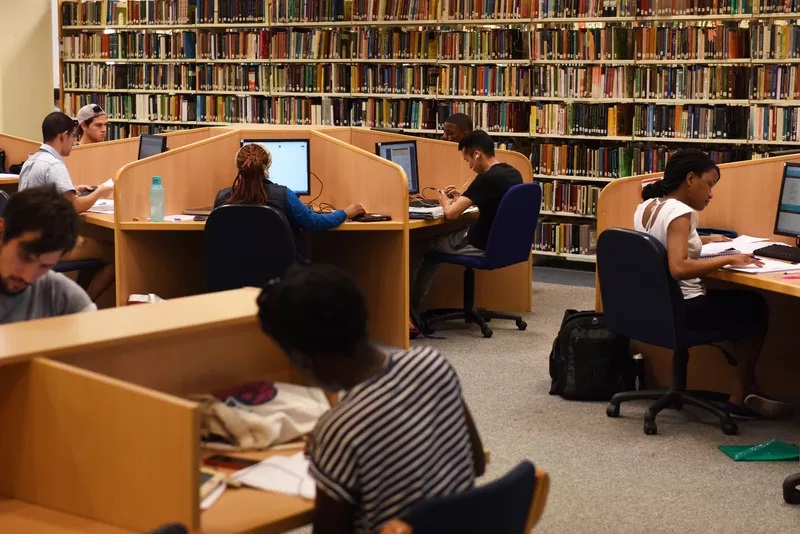‘Knowledge Colonialism’ & How Africa Is Trying To Overcome It
Dec 29, 2022 | Pratirodh Bureau
Financial barriers posed by global publishing houses have inspired African scholars to find new ways of sharing information (University of Cape Town CC 4.0)
Mary Abukutsa-Onyango is a leader in her field. Deputy vice-chancellor of research, production and extension, and professor of horticulture at Jomo Kenyatta University of Agriculture and Technology, she has more than two decades of expertise in indigenous African food crops.
But when she submitted papers to well-regarded international scientific journals describing the findings of recent research into the role African indigenous vegetables might have in addressing poverty, malnutrition and food insecurity in Africa, they were rejected. “Not because the research was not good, but because they regarded the crops I was writing about as weeds,” she says.
Instead, she found an African journal and published her findings. The improved visibility and accessibility of her research influenced the Kenyan government in its development of nutrition schemes for schools. Other East African governments have also adopted the schemes. In a significant irony, global north readers are now adopting these nutrition findings to support balanced diets.
It’s just one example of how African research is excluded from established science publishing. People in developed economies determine what good science is without knowledge of the varying circumstances. This means science which could improve the lives of Africans and others around the world is not being shared, understood and built upon.
But as the world starts to question why access to knowledge is controlled by a small group of corporate publishers, African scientists are developing their own platform for sharing research findings. It’s sparking interest from other regions around the world.
The stakes could not be higher. In exchange for making scientific papers free to read — open access — the corporate publishers will often charge an up-front fee to the scientist. This is a win-win for the publishers, who secure payment either way.
Many nations have negotiated country-wide deals with publishers allowing their scientists to publish and read articles. During these negotiations in South Africa, one publisher inadvertently let slip that in determining the up-front fee for a South African scientist, the publisher weighed up whether the journal had a high ‘impact factor’ and the number of articles South Africa was likely to publish as open access.
The calculations mean a South African scientist is paying almost 200 percent more in up-front fees than a UK scientist (or their institution). If South African scientists have access to read high impact journals (while not necessarily publishing in them) via such nation-wide agreements then it pushes up the up-front fee.
Unfortunately, Global South authors rarely get published in these journals, as Mary Abukutsa-Onyango found, due to systemic inequalities. Other constraints, such as finances, also mean Global South scientists are not publishing as often in the leading journals. This likely means Global North scientists are being subsidised by the Global South.
Governments and major funders in developed economies, driven by the philanthropic ideal of open access, have been blind-sided by the extractive business model.
The nation-wide agreements, conceived in the Global North, have shifted the prejudice from reading to publishing: communities can now read the research but cannot publish their own research because they cannot afford the up-front fees. This pay-to-publish model shifts the accessibility problem from the end of the publication process to the beginning. In essence, those without the funds to pay publication fees are further disenfranchised. Paywalls have been substituted with publication walls. The new and growing business model of open access and up-front fees is milking the Global South.
What is not factored is how this expands the scholarship divide between the Global North and the Global South.
The 2002 Budapest Declaration and the subsequent Bethesda and Berlin Declarations on open access commit to the two-way flow of information from the rich to the poor and the poor to the rich. The declarations underscore publishing for sheer inquiry and knowledge.
Unfortunately, the business model for open access has detracted from the noble founding pillars of the movement and has unintentionally created a new crisis: the entrenchment of the one-directional flow of research materials. The entrenchment of the Global North-dominated scholarly ecosystem promotes knowledge colonialism.
African scholarship requires channels for the dissemination of knowledge – the publishing landscape should be more inclusive. Any interventions should be underpinned by principles of equity. Inclusivity and equity, working in concert, will transform the current publishing landscape with the ultimate goal of making scholarship open for all – to readers and authors.
The good intentions of governments and funders, publishers’ business models and the inherent biases of the publishing ecosystem have given impetus for developing an African publishing platform.
This platform is intended to make African scholarship more discoverable, visible and accessible. African universities or research institutions and their journals are now ‘tenants’ on the larger platform, with the microsites providing a sense of pride in the authors and their institutions. There is no cost to the author for publishing and no cost to the users for reading. The cost of publication and access is borne by contributions from academic institutions. Currently, institutions from Namibia, Zimbabwe and Cameroon are publishing on the platform. Institutions from Benin and Nigeria will be publishing from 2023.
The continental platform addresses the problems of up-front fees, rights retention and biases, both conscious and unconscious. The creation of this platform, ensuring there is no compromise on academic rigour, gives African institutions a forum to share their scholarship. Open access interventions, previously a barrier for the Global South, are barriers no longer.
(Originally published under Creative Commons by 360info™. Read the original article here.)
